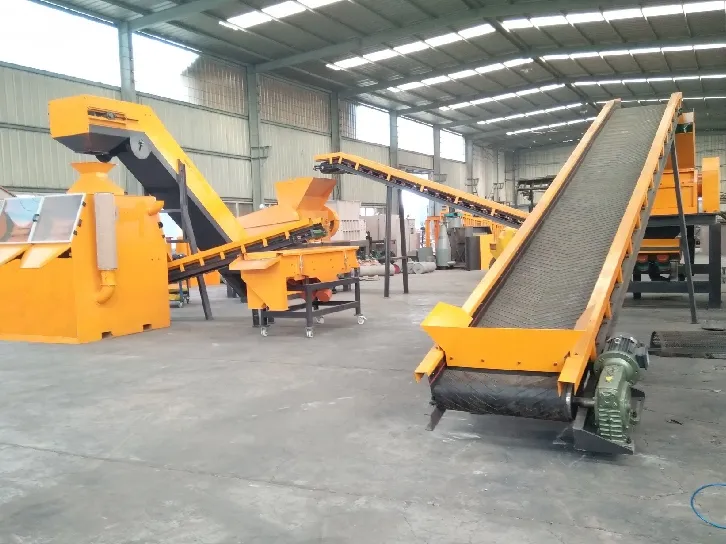

dec. . 05, 2024 08:32 Back to list
How to Recycle Old Electronics A Comprehensive Guide
In today’s digital age, electronic devices are an integral part of our daily lives. From smartphones and laptops to televisions and gaming consoles, we rely heavily on technology. However, as these devices become obsolete or break down, they often end up in landfills, contributing to environmental issues. Recycling old electronics, or e-waste, is crucial for mitigating these problems. This article aims to provide a comprehensive guide on how to recycle your old electronics responsibly.
Understanding E-waste
E-waste is defined as discarded electrical or electronic devices. It encompasses a wide range of products, including computers, phones, tablets, printers, and even household appliances. The significance of recycling e-waste lies in the harmful substances often contained within these devices, such as lead, mercury, and cadmium. When e-waste is improperly disposed of, these toxic materials can leach into the soil and water, posing a threat to human health and the environment.
Why Recycle Electronics?
Recycling old electronics helps reduce the number of devices that end up in landfills, conserves natural resources, and minimizes environmental pollution. Moreover, many electronic devices contain valuable materials such as gold, silver, and copper. These materials can be recovered and reused, reducing the need for mining and the associated environmental degradation. By recycling, you contribute to a sustainable economy and help foster a circular economy where materials are reused rather than discarded.
Steps to Recycle Old Electronics
1. Assess Your Electronics Start by evaluating which devices you no longer need. This could be anything from outdated computers to broken appliances. Determine whether the items can be repaired or upgraded, as this could extend their life and reduce waste.

2. Check for Donation Opportunities If your electronics are still functional, consider donating them to local charities, schools, or community organizations. Many of these entities accept working devices and appreciate the donation, allowing them to support educational programs or provide services to those in need.
3. Research Recycling Programs Look for local recycling programs and e-waste drop-off centers. Many municipalities have designated pickup days for electronic recycling or permanent sites where you can bring your old devices. Additionally, several manufacturers and retailers offer take-back programs, allowing you to return your old electronics for proper recycling.
4. Secure Your Data Before recycling any electronic device, ensure that all personal information is removed. This step is crucial for protecting your privacy. For computers, perform a factory reset and overwrite your data. For smartphones, delete all personal information and perform a reset. Remove any SIM cards or storage cards from devices before disposal.
5. Check for Certification When choosing a recycling option, ensure that the facility complies with e-waste recycling standards. Look for programs certified by organizations such as e-Stewards or R2 (Responsible Recycling). These certifications ensure that e-waste is processed responsibly, avoiding potential environmental hazards.
6. Participate in Drive Events Many communities organize electronic recycling drives, often hosted by local governments or environmental organizations. These events provide a convenient way to dispose of multiple devices safely. Stay informed about these events through community boards or local news outlets.
7. Educate Others Share the importance of e-waste recycling with friends and family. Many people are unaware of the proper disposal methods for electronics. By educating those around you, you contribute to a more widespread change in behavior regarding e-waste.
Conclusion
Recycling old electronics is a vital component of environmental sustainability and responsible consumer behavior. By taking the time to assess, donate, recycle, and educate others, we can collectively combat the growing issue of e-waste. Remember, our electronic devices are not just tools; they contain valuable materials and hazardous substances that can impact our health and the planet. Through conscious recycling practices, we can make a difference and pave the way for a greener, more sustainable future. Embrace the change and lead by example—let’s recycle our old electronics wisely!
Latest news
Troubleshooting Common Eddy Separator Problems
NewsJul.04,2025
The Role of Metal Recycling Plants in Circular Economy
NewsJul.04,2025
The Impact of Recycling Line Pickers on Waste Management Costs
NewsJul.04,2025
Safety Features Every Metal Shredder Should Have
NewsJul.04,2025
How Industrial Shredders Improve Waste Management Systems
NewsJul.04,2025
How Cable Granulators Contribute to Sustainable Recycling
NewsJul.04,2025